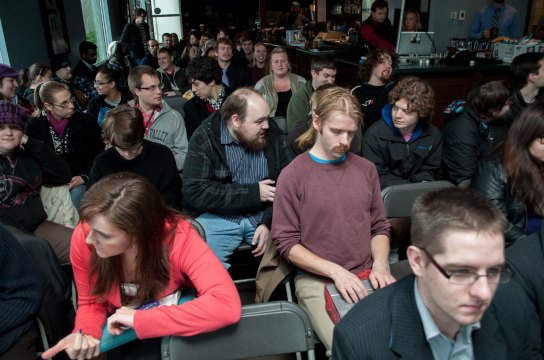By Jessica Wind (The Cascade) – Email
Print Edition: April 3, 2013
If anyone had questions regarding Robert’s Rules and the proper protocol for SUS meetings, all was made clear at Thursday’s annual general meeting (AGM). President Shane Potter had the SUS governing manual close to hand, and University Christian Ministries (UCM) president Derrick Uittenbosch held a copy of Robert’s Rules. Both rule guides were referenced again and again as students voted on board honoraria, budgets, board reform and more.
In true SUS fashion, the meeting was extended twice and adjourned only after four-and-a-half hours. The agenda was adopted with 13 motions, many of which were brought in at the meeting rather than being submitted beforehand. Some motions were stricken from the agenda in favour of discussing them at the next SUS board meeting. Of the motions that remained, more than one required over 90 minutes for a decision to be made.
Attendance dropped throughout the course of the evening, and by the end of the meeting the minimum quorum of 15 voting members was barely met.
At the end of the day, the AGM marked several major changes; community representatives had their honoraria reinstated, the 2013/2014 budget was approved, and a board reform committee was created among other decisions.
The honoraria debate
November’s budget reform saw the loss of honoraria for representatives-at-large and community representatives. At the time this was considered a temporary measure, but debate surrounded the suggestion of returning monthly payment to these reps.
Returning VP internal Greg Stickland presented the motion to reinstate honoraria, noting that accountability in the form of reports and meeting attendance are both tied to honoraria.
Derek Froese, former Computer Information Systems Student Association (CISSA) president and author of the board reform motion in November, spoke out against the motion.
He pointed out that many students work 15-20 hours a week for free within other clubs and associations – so why do SUS reps deserve payment?
“A lot of very big things have been done on campus by people who are not members of SUS and not a single one of these people ever got paid for any of their work,” he said.
UCM president Derrick Uittenbosch and Biology and Chemistry Student Association (BCSA) president Jennifer Martel also spoke against the motion.
Incoming VP social Zack Soderstrom highlighted the difference between receiving honoraria and working for a wage.
“It’s not a reward for doing work,” he said. “It enables us to work.”
Stickland agreed, pointing out that student associations volunteer for things they want to do, whereas representatives do things outlined in their job description.
Froese suggested the money used for honoraria instead go towards a bursary for student leaders, a term that could be applied to students inside or outside of SUS. No motion or amendment to this effect was ever constructed.
The main motion was eventually amended to reinstate the honoraria for community representatives, but not the representatives-at-large. This amended motion passed.
Point of information: SUS representatives are mandated to work five hours a week, and many argue that they work far more than that. Reps-at-large and community reps were previously awarded an honoraria of $250 a month.
Budget talks
Incoming rep-at-large Thomas Davies served on the external budget committee and presented a report regarding the motion to adopt the budget for the 2013/2014 year.
“We believe that this budget is fair, realistic, and above all, financially prudent,” he said.
Petersen followed this report with a presentation of the budget.
Calculations still remain to be made to distribute the funds originally allocated for rep-at-large honoraria, and the full version of the budget will be released soon. In brief, $53,000 was allocated towards clubs and associations, $130,000 towards AfterMath, $29,000 to emergency grants, and $18,000 towards weeks of welcome.
Board reform?
Potter introduced a motion that would start the process of a larger board reform within SUS, which sparked debate between students and SUS board members alike. The motion would see the creation of a board reform committee within SUS, which would look into the options and feasibility of reform.
Stickland spoke to the need for a board reform.
“Right now we’re trying to make a board structure set for about 2500 students work for a membership of 10,000,” he said, adding that management and execution of tasks often fall to the same person. A board reform would look at fixing this.
Outgoing aboriginal representative Harrison Depnar moved to amend the motion, calling for a referendum to ask the student body if they approved the creation of the committee before SUS spent time researching something that didn’t reflect the wants of the students. This idea was contested among the assembly.
“Instead let’s create the commission and trust them to come up with the best way to implement it,” countered Froese.
Potter and Doyle both argued that a commission can choose to hold a referendum at the end of their findings, one way or another.
Hepnar’s amendment failed, but the motion passed.
Grab bag
Other motions included a request for faster implementation of SUS governing manual updates, which passed. Motions calling for a lower quorum for SUS general meetings and travel reimbursement for clubs and associations executives to attend SUS board meetings were tabled until a later meeting.


